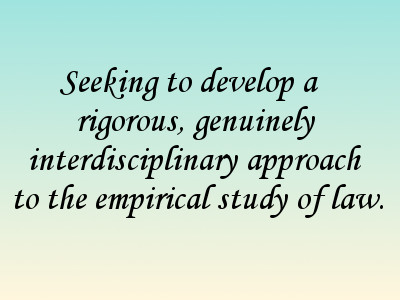The New Legal Realism Project
The New Legal Realism emerged at the turn of the millennium. It has a number of different strands, but they all share an interest in forging a new interdisciplinary approach to studying law. In recent years, legal academics have shown renewed interest in social science. However, to date there has been no organized paradigm within the legal academy for translating and integrating diverse social science disciplines and methodologies. NLR scholarship pays systematic attention to this process of translation and integration. It draws on the full range of empirical approaches, including qualitative, quantitative, and experimental methods. NLR research also involves sophisticated linking of empiricism and theory, guided by best practices within the social sciences. Like the “old” legal realists, we seek to bring the best of current social science and legal scholarship to bear on important policy issues of our day – but with the benefit of several generations of new knowledge.
Translating Social Science and Law
Too often, scholars and policymakers have assumed that we can simply pick up the findings of social science and use them in legal settings. This assumption of transparency does not take account of the vast differences in goals and epistemologies that characterize diverse disciplines. These differences exist even among the social sciences themselves, and become still more marked when we move into legal domains. A number of disciplines have devoted systematic attention to the issues involved in translating across differences of this kind. The NLR project draws on existing research to raise questions about the process of interdisciplinary translation, in an effort to correct mistaken assumptions of transparency. We hope to encourage a conversation about the use of social science to inform legal practices, in order to build a more rigorous and informed framework for the interdisciplinary study of law. This will have implications not only for scholarly debates, but also for the use of social science in policy arenas and in legal education.
Combining Qualitative and Quantitative Approaches
Every social science method has its advantages and disadvantages. To achieve a better understanding of one aspect of human experience, each method sacrifices precision regarding other aspects. For example, quantitative methods permit us to generalize about findings, but at the price of detailed, fine-grained contextual analyses. The most qualitatively oriented methods, such as participant observation, provide more thorough information about the actual social contexts in which law operates. However, this kind of work requires us to focus in detail on particular settings, leaving a question about whether the findings from one setting can be generalized to another. Combining diverse social science methods and perspectives permits us to provide a more encompassing understanding of the dilemmas facing law. NLR is working to develop just such an integrative interdisciplinary approach.

